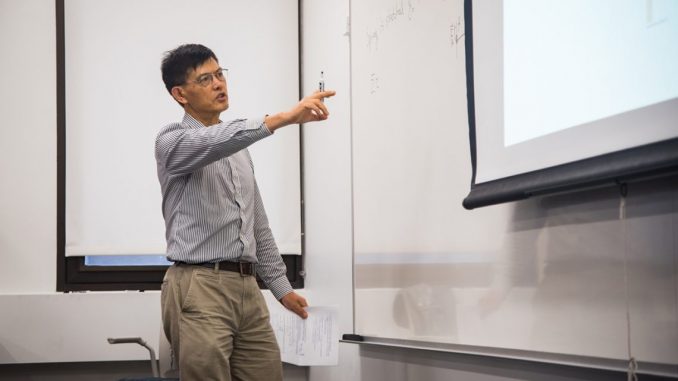
Updated on 4/12 at 11:12 p.m.
Lawyers for Xiaoxing Xi, a Temple University physics professor, are discussing plans to appeal a federal court’s March 31 decision to dismiss a majority of his legal claims against United States government officials who accused him of sharing sensitive technology plans with China in 2015, said Jonathan Feinberg, an attorney for Xi.
U.S. District Judge R. Barclay Surrick dismissed nine of the 10 counts in Xi’s lawsuit, and the final count, which regards FBI agents allegedly surveilling Xi’s communications without a warrant, will be dealt with in a separate decision, according to an April 2 press release from the American Civil Liberties Union, which represented Xi.
Xi, the Laura H. Carnell professor of physics, filed the lawsuit in the U.S. District Court for the Eastern District of Pennsylvania on May 10, 2017. In his complaint, Xi alleged agents from the Federal Bureau of Investigation violated his rights by subjecting him to racial and ethnic profiling and unlawful searches and seizures.
“Professor Xi’s case involved egregious and wrongful discrimination, culminating in a baseless prosecution,” wrote Ashley Gorski, a senior ACLU attorney who represented Xi, in the press release. “His case is not an isolated one, and is in fact emblematic of the FBI’s targeting of Chinese American scientists across many years. We’re disappointed with the court’s decision.”
The FBI’s investigation into Xi occurred within 10 months of two other espionage-related prosecutions of Chinese American scientists, with the government’s charges against the scientists being dismissed before trial in both cases. The other two cases involved Sherry Chen, a National Weather Service hydrologist from Ohio, and Guoqing Cao and Shuyu Li, senior biologists at Eli Lilly and Company, and were filed in March 2015 and December 2014, respectively, according to the ACLU.
“I knew that there were Chinese people before me who were arrested for things, but I never imagined it would happen to me,” Xi said. “I feel an obligation to tell people about what happened to me because when I opened my door and saw all these armed agents outside of my house, I couldn’t believe it.”
Xi received the American Physical Society’s Andrei Sakharov Prize, a prize usually reserved for exceptional lab work, in 2019 for his efforts advocating for other Chinese American researchers targeted by the government, The Temple News reported.
The U.S. Department of Justice declined to comment on the dismissal of the counts.
Xi was charged with four counts of wire fraud in May 2015 after a grand jury found him guilty of sharing the technology of a pocket heater from Superconductor Technologies Inc., an Austin, Texas, superconductivity technology company, with entities in China, according to the lawsuit.
One week later, FBI agents allegedly arrived on Xi’s doorstep in Penn Valley, Pennsylvania, with a battering ram and forcefully arrested him while holding his wife and two daughters at gunpoint. Xi was then allegedly interrogated and strip-searched while in FBI custody, according to the lawsuit.
The charges against Xi were dropped in September 2015 after Xi and his attorneys presented evidence that the information Xi shared with the Chinese entities was legal, according to the lawsuit.
The lawsuit alleges FBI agents knew prior to Xi’s arrest that his interactions with the Chinese entities were legal, meaning they “intentionally, knowingly and recklessly” presented federal prosecutors with their misinterpretation of Xi’s communications without verifying the accuracy of their claims.
The FBI agents’ actions allegedly were at least partially motivated by the fact that Xi is racially and ethnically Chinese and was a Chinese national prior to becoming a U.S. citizen, according to the lawsuit.
Xi allegedly suffered multiple consequences as a result of the FBI’s investigation, including being temporarily suspended from his position as the interim chair of Temple’s physics department until the charges against him were dropped in September 2015 and losing access to his lab and the graduate students working under his supervision, according to the lawsuit.
“When I came back, it was like all these things that were so familiar to me four months ago were completely foreign,” Xi said. “It was like everything in my mind was replaced physically, and the only thing in my mind was how to win our case and how to clear my name.”
Xi was most excited to see his students upon returning to Temple from his suspension, he said.
“The students in my group welcomed me back and I was very moved,” Xi said. “They gave me a bouquet of flowers and we were so happy, but I realized that to change from being just a regular citizen to being challenged under federal prosecution is huge. So to change back to being a normal citizen, that takes a long, long time, and I don’t think it will ever be completely over.”


Be the first to comment